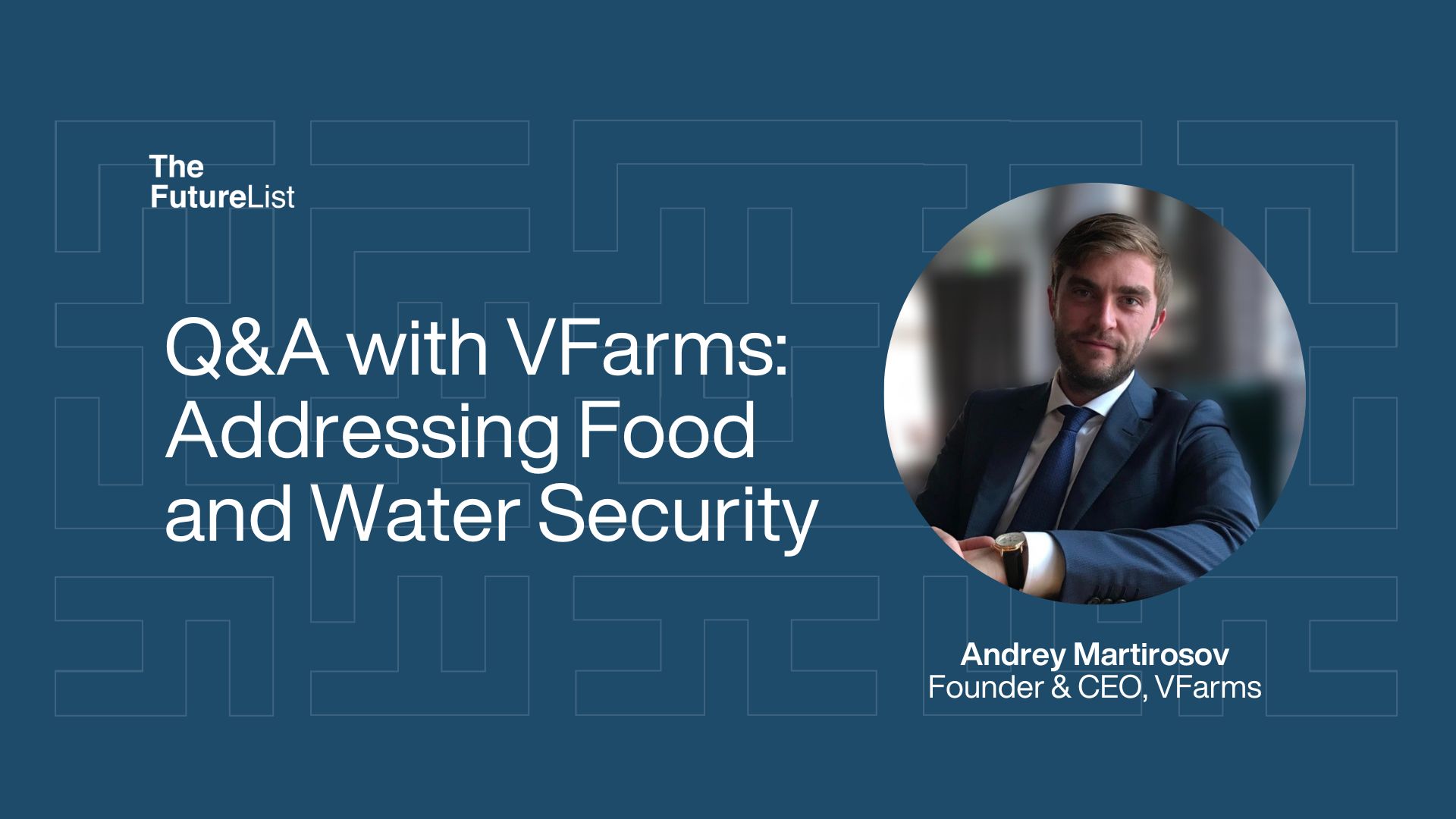
Q&A with VFarms: Addressing Food and Water Security
By David Armaah
Founder Profile
Andrey Martirosov is the Founder & Chief Executive Officer of VFarms with a passion for sustainability and innovations in agriculture. He has over 5 years of experience in high-tech ventures and has led several teams before founding VFarms. Andrey has a strong academic and business background in business development, project management, finance, and marketing. His mission is to leverage technology and creativity to overcome the most pressing challenges for food production and water scarcity, leading to positive social and environmental impacts.
This Q&A session dives into his startup VFarms in Doha, Qatar – – learning about their technology and how they address global food and water security challenges.
Q: What inspired the founding of VFarms?
A: The inspiration came from a quest to feed people with less or no arable land in regions facing harsh climatic conditions, creating sustainable food and water systems. To transform an intangible idea into a tangible achievement, I decided to found VFarms in Qatar in 2021. Qatar was not chosen by chance but purposefully. The whole country is almost a complete desert with one of the harshest climates in the world from the point of view of cultivating food. Despite this, Qatar’s agricultural sector is surging due to increased food demand as a result of rapid population growth and government-backed initiatives, which aim to enhance food security in the country.
Q: Could you discuss any challenges or obstacles VFarms has faced in implementing its technology, and how the company has worked to overcome them?
A: VFarms has faced a wide range of challenges typical for innovative ventures. So far, the most crucial challenges have been the following:
- Shortage of skilled workers. The agritech industry has a smaller talent pool compared to more established industries. This scarcity has made it difficult for VFarms to find qualified candidates with the right combination of agricultural knowledge and technological skills. To overcome this challenge, our team has extensively collaborated with educational institutions, scientific centers, and job consultants to create awareness about the exciting opportunities of working at VFarms.
- Defining a minimum viable product. It is no secret that a failure to create hardware or software products that appeal to potential customers or to make such products available on commercially reasonable terms will sooner or later shut down your business. To avoid such failures, in the design stage, our team decided to reduce the initial features of VFarms’ controlled-environment agriculture facilities to a bare minimum, the ones that truly provide the value we wanted to deliver to our customers, to avoid high production and pivoting costs. We also did efficient prototyping of all subparts so that no issues arise in the future.
- Selection of manufacturing partners. VFarms’ business is tied to manufacturing partners that take up most of the production workload. From day one, it has been very important to choose manufacturing partners who are diligent, sincere, and trustworthy. Our team has avoided communications with middlemen who acted as the point of connection between VFarms and the manufacturers. When choosing manufacturing partners, we have looked for proper referrals and documentation and, most importantly, met the manufacturing teams on the ground and saw the progress of things firsthand.
- Lack of relevant experience. Controlled-environment agriculture in general has been around for a long time. Some experts have spent a significant amount of time and resources to understand trends and make products that provide value to buyers. None of VFarms’ current team members had significant expertise in the field of controlled-environment agriculture before joining the company. To avoid unforeseen issues because of a lack of experience and knowledge, VFarms partners with well-known and reputable experts who guide the company in the right way so that design and manufacturing processes are implemented properly with the funds being used in the best way possible.
Q: What has been your market impact so far – in terms of numbers & storytelling?
A: Since its foundation, VFarms has made a significant impact by introducing the world’s first indoor farming facility in Qatar that operates without any external water supply sources. The company has not only showcased its proof of concept at the International Horticultural Exhibition EXPO 2023 in Qatar but also received a grant from the Gulf state’s agribusiness investment arm to develop a commercially viable indoor farming solution for the cultivation of lettuce in arid conditions. When we complete this development, VFarms will be in a good position to commence mass production of its facilities to help Qatar enhance its food self-sufficiency and overcome supply chain challenges.
Q: Lastly, how do you see VFarms contributing to the broader conversation around sustainable agriculture and innovation in the coming years, and what role do you envision the company playing in shaping the future of food production globally?
A: We all know that agriculture is in the early days of yet another revolution, at the heart of which lies artificial intelligence, analytics, renewable energy, and autonomous robots. Even though VFarms has already made a tangible contribution to sustainability and autonomous solutions in agriculture, there is still a long road ahead of us before VFarms comes up with a fully autonomous indoor farming solution that can perform tasks and operate in almost any environment independently, without human control or intervention. A fully autonomous farming process is the area in which I believe VFarms can contribute the most in the future.
Get innovation insights from The FutureList weekly. Subscribe to our newsletter here
Categories
- Agritech
- Artificial Intelligence
- Biotech
- Blockchain
- Climate Tech
- Data Infrastructure
- Edtech
- Events
- Fashion
- Fintech
- Healthtech
- Infrastructure
- Innovation Memos
- Innovation Scout Program
- Insight
- Insurtech
- Machine Learning
- Martech
- Mobility
- Procurement
- Proptech
- Ridehailing
- Ridesharing
- Space Aviation
- Supply Chain
- Talent
- Telecoms
- Venture Capital
- Wastetech
- Women In Tech